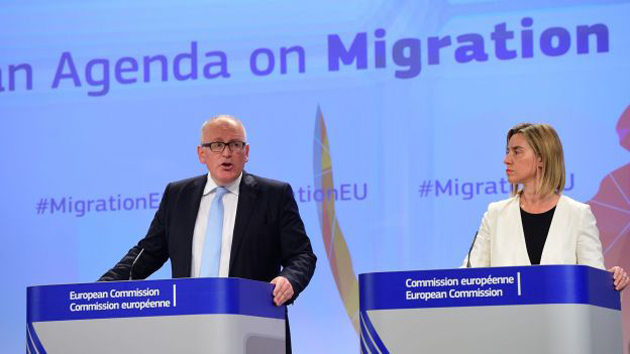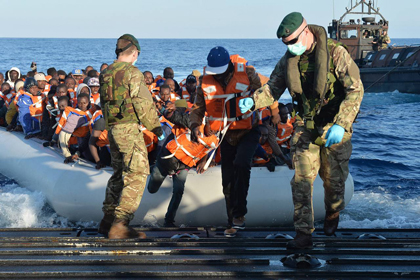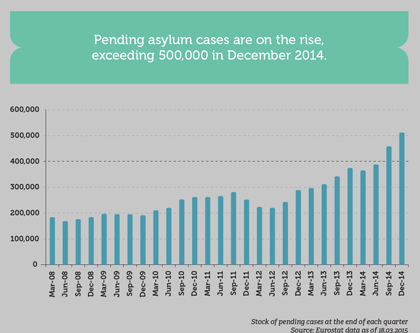The Comission introduces a country-by-country quota system to respond to the Mediterranean crisis. Evangelicals had asked for real solutions in recent weeks.
 Frans Timmermans and Federica Mogherini announcing the new EU plan. / Getty
Frans Timmermans and Federica Mogherini announcing the new EU plan. / Getty
Brussels introduced on Wednesday an ambitious plan to tackle the migration crisis in the European Union. The Commission will ask EU member countries to accept a country-by-country quota system for resettling refugees.
The Comission introduced the “European Agenda on Migration” (see official statement here). Asylum seekers will be spread among EU member states via a quota system based on a) population b) GDP c) unemployment and d) the number of asylum claims it has already received.
The EU plan will be funded with €50 million and aims to strike the balance between being tough on returning migrants without a right to stay, and protecting asylum seekers in danger in an effort to persuade skeptical member countries.
 naval personnel rescue migrants from an inflatable craft in the Mediterranean Sea between Italy and Libya . / AP
naval personnel rescue migrants from an inflatable craft in the Mediterranean Sea between Italy and Libya . / APThe plan will enforce measures to lower the number of refugees making dangerous journeys to enter Europe. These included sending migration officers to selected non-EU countries, increased co-operation with officials in war-torn Libya, and further efforts to clamp down on networks of people smugglers.
STRONG REACTIONS
The UK, Denmark and Ireland can opt out of EU justice and home affairs policies, and UK’s government already announced they would “resist calls for the mandatory relocation.” Other EU members like Hungary also reacted in disapproval.
Norbert Röttgen, chairman of the Germany’s foreign affairs committee, said: “It is a question of EU-wide fairness, since it is a matter that affects Europe as a whole. In this sense, the participation of all member states in the plan is necessary.”
The new quotas would mean that Germany will take 18% of the redistributed asylum seekers, France 14%, Spain 13%, Italy 12%, and countries like Sweden (which had 14% of EU’s refugees in 2014) would reduce their contribution to 2%.
In 2014, EU countries gave refugee status to 185,000, most of them being accepted in Germany, France and Sweden.
POLITICAL ACTION FOR AN URGENT CRISIS
The UN estimates that 60,000 people have already tried to cross the sea from North Africa this year, resulting in 1,800 deaths - a 20-fold increase on the same period in 2014.
 Pending asylum cases in 2014. / Euractiv
Pending asylum cases in 2014. / EuractivIn the first weekend of May 2015 alone, Italy rescued more than 6,000 migrants, and hundreds have lost their lives, with 700 perishing in a single incident when their boat capsized off the Lybian coast.
“The structural long-term objectives (are) obviously solving the root causes of this immense flow of people that is not going to stop tomorrow, and the immediate urgencies: savings lives, taking care of the lives we save…sharing responsibility to protect the people we save, and fighting the traffickers and smugglers organisations,” said EU Foreign Policy Chief Federica Mogherini during a press conference
Deputy Commission chief Frans Timmermans added that it was time to turn the “words” of solidarity between EU countries in dealing with the crisis in the Mediterranean into “action”. "What will make the situation worse is doing nothing," he added.
EVANGELICALS: LET'S ADDRESS THE PROBLEM
Evangelical Christians have voiced their opinion on the Mediterranean crisis in the last weeks.
 Christel Lamère Ngnambi, EEA.
Christel Lamère Ngnambi, EEA. “The migration debate has become a political hot potato. Voters’ behavior and demagogical rhetoric have obviously blurred the fact that migrants are first and foremost fellow human beings”, said European Evangelical Alliance’s representative in Brussels Christel Lamère Ngnambi.
Thomas Albinson, ambassador for Refugees, Displaced and Stateless People of the World Evangelical Alliance (WEA) added in an article published in Evangelical Focus: “As Christians, we need to avoid falling prey to those trying to manipulate public opinion by inciting fear. When we picture the women, children and men coming across the sea, we must not envision them as potential terrorists and criminals. The truth is that the majority are seeking refuge from terrorists, violence, war and persecution. They are the threatened ones.”
Italian evangelicals’ thoughts go in the same direction. Italian Evangelical Alliance board member Leonardo de Chirico wrote: “Global migration in order to escape wars and persecutions is not something that a single nation or few nations can address on their own. It involves millions of people, several regions in the world, a complex history behind, religious movements. The whole of the international European community should learn to address it. Europe is very committed to preserve its financial stability and monetary wealth, but it's still totally unprepared to have a global vision of its own role in the world.”

Las opiniones vertidas por nuestros colaboradores se realizan a nivel personal, pudiendo coincidir o no con la postura de la dirección de Protestante Digital.
Si quieres comentar o